Rnsg misc Study guides, Class notes & Summaries
Looking for the best study guides, study notes and summaries about Rnsg misc? On this page you'll find 86 study documents about Rnsg misc.
Page 2 out of 86 results
Sort by
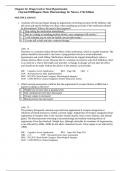
-
Chapter 22: Drugs Used to Treat Hypertension Clayton/Willihnganz: Basic Pharmacology for Nurses, 17th Edition
- Exam (elaborations) • 11 pages • 2023
- Available in package deal
-
- $9.49
- + learn more
1. A patient who has just begun taking an angiotensin converting enzyme (ACE) inhibitor calls the nurse and reports feeling very dizzy when standing up and asks if the medication should be discontinued. What is the nurse’s best response? a. “Stop taking the medication immediately.” b. “Rise to a sitting or standing position slowly; your symptoms will resolve.” c. “I will schedule you to visit the health care provider today.” d. “Cut the pill in half and take a reduced dosag...
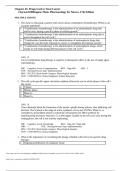
-
Chapter 43: Drugs Used to Treat Cancer Clayton/Willihnganz: Basic Pharmacology for Nurses, 17th Edition
- Exam (elaborations) • 8 pages • 2023
-
- $10.49
- + learn more
1. The nurse is educating a patient with cancer about combination chemotherapy. Which is an accurate statement? a. “Combination chemotherapy is the administration of an antineoplastic drug that will be toxic during a specific phase of cellular growth.” b. “Combination chemotherapy is the administration of an antineoplastic drug that is active throughout the cell cycle.” c. “Combination chemotherapy is the administration of antineoplastic drugs that change the way the body respon...
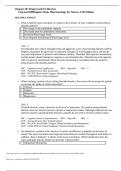
-
Chapter 28: Drugs Used for Diuresis Clayton/Willihnganz: Basic Pharmacology for Nurses, 17th Edition
- Exam (elaborations) • 9 pages • 2023
-
- $9.49
- + learn more
5. How soon will diuresis be expected to occur after the nurse has administered 20 mg of furosemide (Lasix) intravenously (IV) to a patient with heart failure? a. As soon as injected b. Within 10 minutes c. After 2 hours d. After 4 hours ANS: B The onset of diuresis following IV furosemide administration is 5 to 10 minutes after administration. The diuretic effect peaks within 30 minutes and lasts approximately 2 hours. DIF: Cognitive Level: Comprehension REF: Page 436 OBJ: 5 TOP: Nurs...
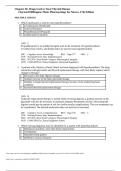
-
Chapter 36: Drugs Used to Treat Thyroid Disease Clayton/Willihnganz: Basic Pharmacology for Nurses, 17th Edition
- Exam (elaborations) • 8 pages • 2023
-
- $9.49
- + learn more
2. A patient with a history of heart failure has been diagnosed with hypothyroidism. The drug interaction with glycosides and thyroid replacement therapy will most likely require which change in therapy? a. Decrease in the daily digoxin dosage b. Gradual increase in the daily glycoside dosage c. Inability to begin thyroid replacement therapy because of the underlying heart condition d. Increased thyroid replacement dosage ANS: B If thyroid replacement therapy is started while receiving ...
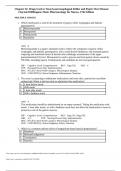
-
Chapter 32: Drugs Used to Treat Gastroesophageal Reflux and Peptic Ulcer Disease Clayton/Willihnganz: Basic Pharmacology for Nurses, 17th Edition
- Exam (elaborations) • 9 pages • 2023
- Available in package deal
-
- $8.49
- + learn more
1. Which medication is used in the treatment of gastric reflux esophagitis and diabetic gastroparesis? a. Metoclopramide b. Misoprostol c. Pantoprazole d. Ranitidine ANS: A Metoclopramide is a gastric stimulant used to relieve the symptoms of gastric reflux esophagitis and diabetic gastroparesis, aid in small bowel intubation, and stimulate gastric emptying and intestinal transit of barium after radiologic examination of the upper gastrointestinal (GI) tract. Misoprostol is used to pre...
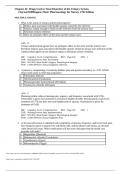
-
Chapter 41: Drugs Used to Treat Disorders of the Urinary System Clayton/Willihnganz: Basic Pharmacology for Nurses, 17th Edition
- Exam (elaborations) • 8 pages • 2023
-
- $9.49
- + learn more
1. What is the action of urinary antimicrobial agents? a. Reduce pain associated with bladder spasms caused by the infection b. Enhance output enough to flush out the infection from the urinary tract c. Eliminate urinary retention d. Have an antiseptic effect on the urine and the urinary tract ANS: D Urinary antimicrobial agents have an antiseptic effect on the urine and the urinary tract. Pyridium reduces pain associated with bladder spasms related to urinary tract infection (UTI). Anti...
Health Assessment for Nursing Practice 7th Edition by Wilson Test Bank - Your Complete Guide

-
Chapter 34: Drugs Used to Treat Constipation and Diarrhea Clayton/Willihnganz: Basic Pharmacology for Nurses, 17th Edition
- Exam (elaborations) • 9 pages • 2023
-
- $9.49
- + learn more
1. When the nurse assesses bowel habits in a patient, which is the best example of normal bowel elimination? a. Daily bowel movements b. Multiple soft stools daily c. Daily liquid stools d. Regular bowel elimination pattern of soft stool ANS: D Normal bowel habits are stools that are soft and occur on a regular schedule of elimination for that particular patient. Although this may be routine for some people, it is not normal for everyone. Liquid stools are not considered normal. DIF: C...
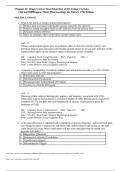
-
Chapter 41: Drugs Used to Treat Disorders of the Urinary System Clayton/Willihnganz: Basic Pharmacology for Nurses, 17th Edition
- Exam (elaborations) • 8 pages • 2023
- Available in package deal
-
- $8.49
- + learn more
1. What is the action of urinary antimicrobial agents? a. Reduce pain associated with bladder spasms caused by the infection b. Enhance output enough to flush out the infection from the urinary tract c. Eliminate urinary retention d. Have an antiseptic effect on the urine and the urinary tract ANS: D Urinary antimicrobial agents have an antiseptic effect on the urine and the urinary tract. Pyridium reduces pain associated with bladder spasms related to urinary tract infection (UTI). Anti...
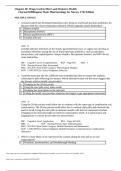
-
Chapter 40: Drugs Used in Men’s and Women’s Health Clayton/Willihnganz: Basic Pharmacology for Nurses, 17th Edition
- Exam (elaborations) • 8 pages • 2023
-
- $9.49
- + learn more
2. A patient states that she has a difficult time remembering when to resume her triphasic contraceptive pills following her menses. Which alternative plan will the nurse suggest that she discuss with her health care provider? a. Changing to the 28-day packet b. Using the inert pills every other month c. Changing her prescription to the mini pill d. Calling the health care provider whenever she forgets to get appropriate instruction ANS: A Using the 28-day packet would allow her to conti...

Study stress? For sellers on Stuvia, these are actually golden times. KA-CHING! Earn from your study resources too and start uploading now. Discover all about earning on Stuvia



